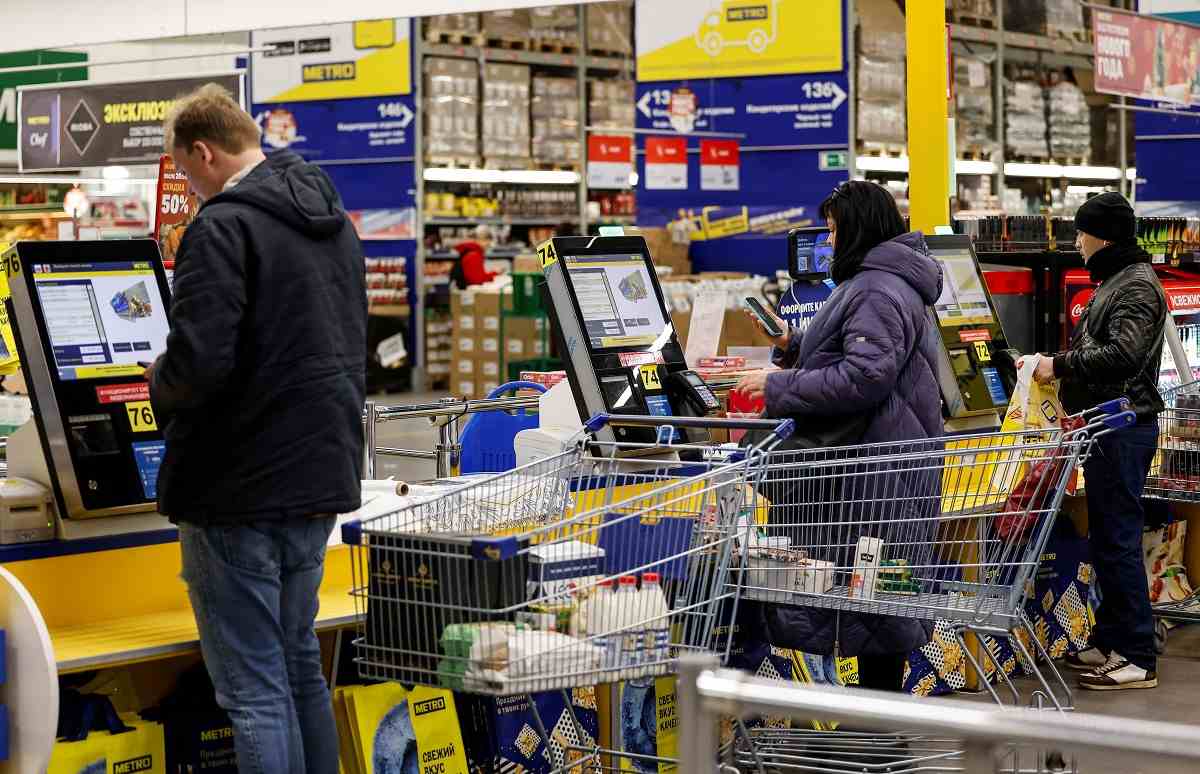Russia Endures the West’s Economic Sanctions after 2 Years of Aggression; the EU Fails to Cut off Resource Imports

People use self-checkout counters at a Metro Cash and Carry hypermarket in Moscow in December.
21:00 JST, February 21, 2024
LONDON — Hit with economic sanctions from the West, Russia has switched the export destinations of its energy resources — its main source of income — to China, India and elsewhere and has maintained fiscal management that includes financing the aggression against Ukraine.
European countries, meanwhile, are stuck paying huge sums of money to Russia as they are unable to embargo Russia’s natural gas, on which they are highly dependent.
Self-sufficiency
The bustle of Moscow has not changed much since before the start of its aggression in Ukraine. Stores open as usual, and fresh food is still abundant at supermarkets despite a smaller selection of beverages and confectionery imported from the West.
Russia’s real gross domestic product in 2023 increased by 3.6% from the previous year to about 139 trillion rubles (¥226 trillion), a level exceeding that of the pre-aggression year of 2021. Even in 2022, when the West imposed economic sanctions, Russia’s GDP declined by only 1.2%, a smaller drop than in 2020.
The reason why the Russian economy appears to be robust is largely due to the impact of increased military-related government spending. This year’s defense spending of 10.8 trillion rubles — which accounts for about 30% of national expenditure — is about three times higher than in 2021. Weapons production plants are operating at full capacity, and unemployment has decreased. A labor shortage, which was fueled by the exodus of regime critics from Russia and large-scale conscription, boosted wages. Consumer spending, which accounts for half of its GDP, also recovered.
After Western companies withdrew from Russia, local firms opened for business at retail premises that used to be a McDonald’s or a Starbucks with similar logos and products. Products imitating Western products are now a common sight in stores, such as a drink with a label design very similar to Coca-Cola.
As a countermeasure to the sanctions, the Russian government has issued a decree stating that it would not protect the intellectual property rights of “unfriendly countries” and has broadly authorized the imitation of Western products. It also obliged Western companies withdrawing from Russia to sell their businesses to local companies at less than half the appraised value.
Taking advantage of the sanctions, Russia has diverted the assets of Western companies and expanded domestic demand with a policy to boost domestic production. President Vladimir Putin praised himself at a dialogue meeting with the public on Feb. 2 saying that Russia was becoming a self-sufficient country.
Dirty deals
Russian oil — the main export item subject to U.S. and European sanctions — is being sold at low prices to countries that do not impose sanctions, such as China and India, to earn foreign currency. Russia also exports liquefied natural gas (LNG) to Japan from its Sakhalin-2 project in Russia’s Far East.
The European Union has imposed 12 rounds of sanctions against Russia over the past two years, in what a Dutch lawyer calls “the largest in EU history,” restricting imports of oil and coal and imposing an embargo on electronic components in an effort to prevent Russia from procuring funds for its military.
The Centre for Research on Energy and Clean Air (CREA) — a Finnish research institute — estimated that the EU has reduced its fossil fuel imports from Russia to one-sixth of the pre-aggression level.
Even so, trade not subject to sanctions continues unimpeded.
Natural gas is not on the EU sanctions blacklist due to opposition from member states which fear the impact on their domestic economies. Countries such as Hungary, which relies on Russia for 80% of its natural gas imports, continues trade with Russia.
Demand for LNG has been growing globally, and purchases of Russian LNG by EU states has skyrocketed. According to the international nongovernmental organization Global Witness, Spain and Belgium are the second- and third-largest buyers of Russian LNG after China. This is in contrast to the oil- and gas-producing United States that has cut off fossil fuel trade with Russia.
CREA estimates that since the beginning of the war, Russia has earned €602 billion (¥1 trillion) in revenue from fossil fuel exports, and the EU remains the largest importer of Russian fossil fuels, having paid €187 billion. This is far more than the €33 billion in aid that financially-struggling Ukraine is seeking from the international community this year. The influential German newspaper Zeit criticizes the dirty deals that continue between Europe and Russia.
Jacopo Maria Pepe, a researcher from the German Institute for International and Security Affairs, said Russia has adjusted to sanctions, and Western countries must make efforts to increase the effectiveness of their sanctions and win over countries that buy Russian products.
Top Articles in World
-

Israeli Ambassador to Japan Speaks about Japan’s Role in the Reconstruction of Gaza
-

Videos Plagiarized, Reposted with False Subtitles Claiming ‘Ryukyu Belongs to China’; Anti-China False Information Also Posted in Japan
-

Nepal Bus Crash Kills 19 People, Injures 25 Including One Japanese National
-

China, India Tapping into Promising African Market; Beijing Announces Tariff Cuts, Both Countries Aim to Expand Exports
-

Ukrainian Ambassador Closely Watching Japan’s Revision of Defense Export Rules, Hopes for Future Arms Support
JN ACCESS RANKING
-

Producer Behind Pop Group XG Arrested for Cocaine Possession
-

Japan PM Takaichi’s Cabinet Resigns en Masse
-

Man Infected with Measles Reportedly Dined at Restaurant in Tokyo Station
-

Israeli Ambassador to Japan Speaks about Japan’s Role in the Reconstruction of Gaza
-

Videos Plagiarized, Reposted with False Subtitles Claiming ‘Ryukyu Belongs to China’; Anti-China False Information Also Posted in Japan

























